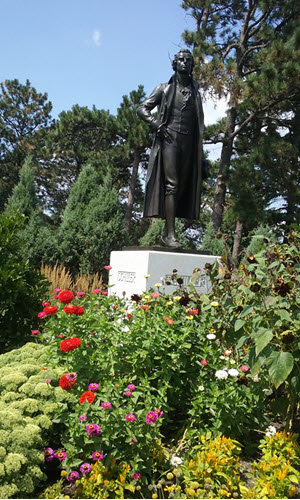| <- Back to main page |

Strolling through the bucolic acres of Como Park in St. Paul, we meet, just beyond the frog pond east of the Conservatory, a bronze statue growing out of a riot of flowers. Is he a Civil War hero? A Founding Father, perhaps? Or some revered luminary from Minnesota’s past? No—it is the German poet Schiller!
So what is Schiller doing hanging out in Como Park? It’s one of those little mysteries one sometimes stumbles across in a city—the tastes and sensibilities of the past efface themselves, and we are left with inexplicable art.
We do know that the bronze was made in Germany in 1905 by Ignatium Taschner, and installed in Como Park in 1907. It was paid for by local German cultural societies, with the intention of promoting goodwill towards their fellow compatriots. Now, if there ever were good feelings towards immigrant Germans in Minnesota, that time was not in 1905. With the military might of Prussia on the rise, Germans were seen as low-born, baby-eating Huns. Schiller’s statue, by contrast, was a reminder of the great German composers, writers and philosophers of the Classical era. While Paris had been besieged by the Prussians in 1870, Schiller was made an honorary citizen of the French Republic in 1792—along with George Washington.
Born in 1759, Friedrich Schiller was the second son of a military officer who became the gardener for the Duke of Württemberg (Württemberg was one of those little Germanic kingdoms that united to make up the modern Deutschland). Though trained as a military surgeon, young Schiller was drawn to literature, and even spent a couple of weeks in prison when he snuck over to Mannheim to see the premier of his first play, The Robbers (Die Räuber). The drama, about a disinherited elder son who defies a petty and corrupt society by becoming a brigand and leading an outlaw band, smacks of Robin Hood, and it certainly did not sit well with the Duke. So Schiller fled Württemberg for good, and made an impecunious living as a playwright in Mannheim and Leipzig until his pal Goethe secured him a position as a professor of History in Jena. There he married Charlotte von Lengefeld; the couple had two sons and two daughters. Later on, Schiller moved to Weimar and with Goethe founded the Weimar theater. He died of tuberculosis in 1805.
Among Schiller’s better known plays are the historical dramas Don Carlos and Wilhelm Tell, and his Wallenstein trilogy. Today, however, he is better known for the poems he wrote in 1797, the year he had a friendly ballad competition with Goethe, and above all his “An die Freude” (“Ode to Joy”), part of which Beethoven used in his marvelous 9th symphony. So when you are listening to that most famous piece of music, and the angelic voices suddenly begin chanting, it is to Schiller you are listening:
Joy, bright spark of divinity,
Daughter of Elysium,
We enter, fire-drunk,
Your holy sanctuary.
Your magic power re-unites
All that custom has divided.
All men become brothers
Under your tender wing.
But back to the statue. Like the glove dropped between a lion and a tiger in Schiller’s ballad “Der Handschuh” (“The Glove”), the bronze landed in a hostile environment. While the real lions and tigers were relegated to Como Zoo (just over the rise), humans were an ever-present danger. The artwork was vandalized during both World Wars, and sulfites and rust also took their toll. Restored in 2012, the Schiller statue once again struts from its pedestal, as if joyfully defying the benighted age of vulgarians, narcissists and consumers it finds itself in.
But now—it’s a nice day, and the picnic grounds and Como Lake beckon. Maybe we can rent a kayak, or fly a kite. After all, living in the present is something Schiller embraced, as proclaimed by the first stanza of his poem “To My Friends”:
Belovèd friends! More glorious times than ours
Of old existed: men of loftier powers
Than we can boast have flourished:—who shall doubt it?
A million stones dug from the depths of Earth
Will bear this witness for the ancient worth,
If History’s chronicles be mute about it.
But, all are gone—those richly-gifted souls—
That constellation of illustrious names:
For Us, for Us, the current moment rolls,
And We, We live, and have our claims.
(Translated by James Clarence Mangan)
